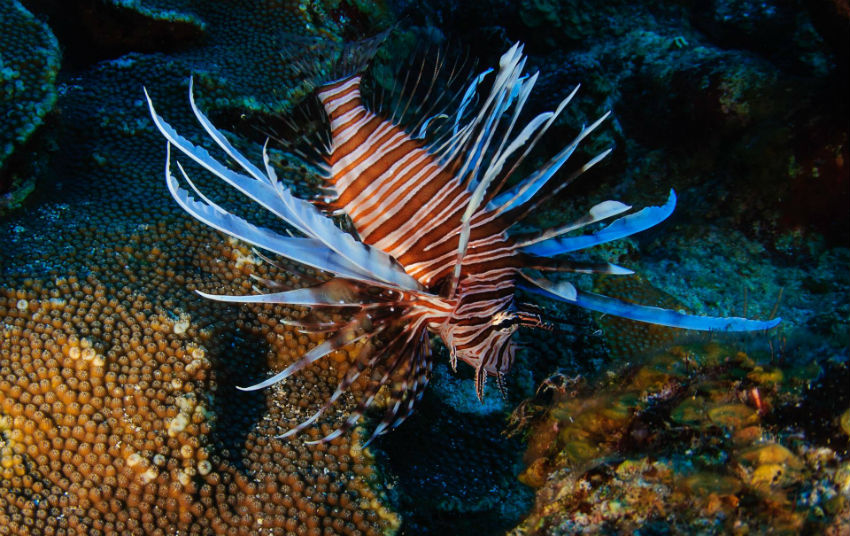Join The 1st Annual Winter Lionfish Tournament
The Bermuda Lionfish Culling Program has launched a three-week-long lionfish tournament for permitted lionfish hunters in Bermuda, with every lionfish caught between now and Sunday, February 1, 2015 counting towards the tournament total.
There will be prizes for the scuba diver and freediver who catch the most lionfish, with the tournament directors also hoping to add additional prizes for runners-up.
The event notice said, “Divers and fishermen across the island are reporting very large numbers of lionfish in shallow waters [30-60 feet, often less] along the south shore and even in inshore areas like St. George’s Harbour.
“Last Sunday, fourteen were caught at John Smith’s Bay alone.
Lionfish photo by Sergey Goncharov
“While this is scary news, it presents a great opportunity to remove big numbers of lionfish from the shallows. It’s also a good opportunity for the research team to get winter data and samples.
“This will be a bare bones operation, so we do not have plans to hold a proper weigh-in event at this time. However, we are offering cash prizes.
“The scuba diver who catches the most lionfish, as long as the total is more than 10, will receive $200. The freediver who catches the most lionfish, as long as the total is more than five, will also receive $200. The largest and smallest fish captured will be worth $50 each.
“If it can be arranged, we hope to have multiple prizes for runners-up. Stay tuned for those details.
“To level the playing field and maximize participation among our permit holders, there will not be prize categories for the technical divers. If we can get more money, we will open a category for you.
“As the focus of this tournament is going to be shallow areas which are more visible to members of the public, please remember to fly your lionfish flag at all times when you are culling.
“To qualify for this tournament, you only need to deliver your lionfish caught between now and Sunday, February 1 to any of our drop-off locations. The lionfish must be whole; not gutted and not gilled.
“Please freeze all lionfish as soon as possible and keep them frozen until you deliver them to Robinson’s Marina.
“You must include a slip of paper with your name, permit number, date of capture, site of capture, and depth of capture for each fish. Please keep fish from different dives separate.”
“For more information, call Malcom Swan at 234-0709, Blue Water Divers at 234-1034, BIOS at 297-1880, Conservation Services in Flatts at 299-2329 [extension 2139], Fisheries at Coney Island at 239-2326, 705-5656, 535-4613, 535-6412, or 535-4616, or Environmental Protection at Botanical Gardens at 239-2322.
“If you were waiting to renew your culling permit until the weather warmed up again, hopefully this will provide an incentive to renew sooner rather than later. You can hunt on your old permit through Friday, January 16, but you should email a renewal application to fisheries@gov.bm by 5.00pm that day.
“Happy hunting.”
Read More About
Category: All, Environment



A good opportunity for the local restaurants to put up some prizes / funding in return for some fish, maybe?
Amazing how bermudians are so clueless as to what is happening in the real world. The rest of earth has long discovered that hunting these fish only caused them TO INCREASE IN NUMBERS, due to them learning and adapting and hiding from the hunting. The fish have gotten smarter and are harder to hunt now, and this led to a vast increase in their numbers. Once again, man tries to interfere and makes it worse!
But this was news like a year ago, but like I said, Bermudians are always so clueless and go blissfully on unawares….
I’m sorry Awareness, but you’re mistaken. Yes, occasionally divers spot a lionfish that seems to be wary and runs from them. And yes, research in the Caribbean suggests this might happen in response to culling programs.
However, it has not caused an increase in their numbers. Their natural biology and feeding habits are responsible for that. Nor would you ever see one of these researchers suggest the culling programs are in any way problematic or should be abandoned. In fact, the leading lionfish researchers and REEF are the biggest advocates of such programs, as they have proven effective at minimizing both the lionfish populations and ecological impact. Please check out: http://www.reef.org/enews/articles/putting-it-work-new-publication-effectiveness-lionfish-culling
For what its worth, it is also just as likely that these few wary fish are just the few that got away because they were always wary.